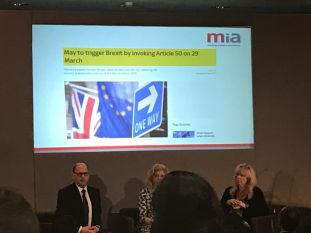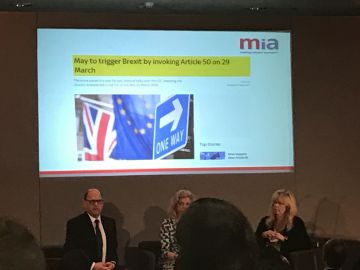MIA Conference
21 Mar 2017 by Charles Manners
The conference was dominated by the impact of Brexit, which not surprisingly was not answered as the outcome is not known! Trevor Williams (from the University of Derby) gave a fascinating presentation on the economic background, which was optimistic regards growth, but with inflation edging up and the deficit not going the economic picture remains uncertain, but world growth driven by low oil prices will drive growth for the next few years.
The Food Panel consisted of William Gorel for Procure Wizard www.procurewizard.com and Catherine Baroun http://consideratehoteliers.com/ from Considerate Hoteliers and myself.
We had a lively discussion and the following themes in an environment which is seeing food inflation after a number of years of food deflation, currently running at 3%, well above CPI and forecast to go higher, all driven by world shortages due to weather and production shortages.
Food wastage, currently 8 to 10% food waste per operation. The first step is to weight the waste, circa £5 per kilo, set targets, use technology and send surplus food for good causes and charities. Food waste is inexplicable linked to the carbon footprint. The key facts are;
- If food waste was a country, it would be the third largest emitter of carbon dioxide
- Food Waste across UK Hospitality Industry - 1 million tonnes of food wasted £2.5 billion;1.3 billion meals wasted;1 in 6 meals wasted
- Food waste in UK hotels specifically:45% Prep; 21% Spoilage; 34% Plate
Develop and action plan (waste less & recycle more) – e.g review procurement & supply chain, portion control, surplus food donation
Menu engineering, which needs to be technologically driven, many programmes link this through to allergen information, but information is key to be able to flex the menus and determine the prices in relation to demand.
Supplier management, creating transparency and creating contracts that have finite end points, for dry goods up to a year and fruit and veg rolling every three months.
Logistics, drop value and frequency of deliveries, all play a part, and if reduced and planned will allow suppliers to reduce or at the minimum mitigate price rises.
Technology, the use of technology, EPOS, linked to purchasing and stock management will greatly assist operators to achieve the above targets
The overriding message was to push back on either food suppliers or contract caterers asking to increase prices menu prices, and to ensure they are managing their supply chain effectively.


